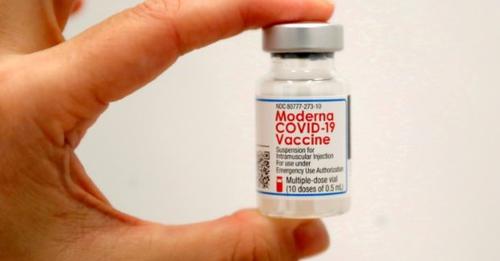
Reuters Photo
The Food and Drug Administration (FDA) has approved the emergency use of the Moderna COVID-19 vaccine on children age 12 to 17.
The Department of Health (DOH), however, has yet to give the go signal for the vaccination of minors.
FDA Director General Eric Domingo on Friday said an emergency use authorization (EUA) had been granted to the US-made vaccine for use on the 12 to 17 age group.
Domingo said vaccinators and doctors should watch out for “very rare cases of myocarditis” once they start administering the Moderna vaccine. Myocarditis, or the inflammation of the heart, occurs in one out of a million people, usually in younger males, he said.
“So we have to watch out for this. But definitely, with the Delta variant affecting a lot of children, our experts saw that the benefit of using the vaccine outweighs the risk,” he said at the Laging Handa briefing.
Zubiri appeal
In June, the Pfizer brand became the first COVID-19 vaccine to receive a Philippine EUA for application on minors, mainly on children 12 to 15 years old.
Thanking the FDA for its ‘’quick action’’ on Moderna, Senate Majority Leader Juan Miguel Zubiri said it was time to roll out the government’s inoculation drive for children and teens amid the growing threat of the Delta variant.
“It’s been so terrifying, seeing the newer strains of the virus striking more and more children, so this approval is fantastic news,” Zubiri said. “As a parent and for all the parents in our country, we hope [the government’s pandemic response task force] will heed our request … Hopefully this move will not just protect our children, but also help us reach herd immunity more quickly.”
According to the Philippine Statistics Authority, there are about 21 million Filipinos age 10 to 19 years old this year, or about a fifth of the 110 million total population.
After Pfizer and Moderna, CoronaVac—the vaccine from the Chinese manufacturer Sinovac—has a pending application with the FDA for its vaccine to be used on children age 3 to 17.
Third dose
Meanwhile, the government’s Vaccine Experts Panel (VEP) has recommended that a third dose be administered on health-care workers who earlier received CoronaVac, citing reports of the Chinese vaccine’s waning efficacy and breakthrough infections involving people who had already received two doses of the brand.
Dr. Rontgene Solante, a VEP member, declined to discuss the panel’s recommendation in detail when asked what would be the preferred brand of the booster shot for such vaccinees.
In a Viber message, Solante said: “We’re just on the fifth month [since most Sinovac vaccinees completed their full dose] and there are already several breakthrough infections. What more during the sixth month and thereafter.”
But Health Undersecretary Maria Rosario Vergeire said the VEP recommendation was not yet final and that another body—the All Experts Group—would meet next week to discuss the matter.
She said the government had tapped other experts and that the decision-making does not end just “because the [VEP] said so.”
One of the things to consider in giving a third dose, she said, is its “cost effectiveness” for the government and the public.
On Friday, National Task Force Against COVID-19 chief implementer Carlito Galvez Jr. said the government had earmarked P45 billion for booster shots.
The task force would soon sign “nonbinding term sheets” with several manufacturers for the boosters, which may be delivered as early as the end of the year, Galvez said.
The World Health Organization, however, has maintained that there’s still a lack of evidence proving the benefits of booster shots, and that countries should first address the issue of vaccine equity.